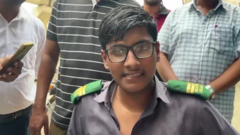In October 2016, the mysterious disappearance of 27-year-old Najeeb Ahmed from Jawaharlal Nehru University highlights the challenges faced by families seeking answers in cases of missing persons.
A Mother's Unyielding Quest: The Tale of Najeeb Ahmed's Disappearance

A Mother's Unyielding Quest: The Tale of Najeeb Ahmed's Disappearance
The tragic story of a missing Indian student continues as the search remains unresolved and a mother fights for justice.
In October 2016, a profound tragedy struck when Najeeb Ahmed, a student at the renowned Jawaharlal Nehru University (JNU) in Delhi, vanished without a trace. Ahmed's disappearance followed an altercation with members of the Akhil Bharatiya Vidyarthi Parishad (ABVP), a right-wing student organization, on the eve of his disappearance. The ABVP members have consistently denied involvement in his fate. Since then, India's Central Bureau of Investigation (CBI) has been grappling with the case, which was handed over to them by local police in 2017. However, with the recent judicial ruling to conclude the investigation, Ahmed's family is left disheartened and seeks further legal avenues to uncover the truth.
Najeeb’s mother, Fatima Nafees, expressed her frustration to BBC Hindi, stating the CBI's inability to locate her son sends a disheartening message regarding the effectiveness of India's investigative agencies. "[...] What message does it send, that India's premier investigating agency has not been able to find a missing student from one of India's best universities?" she lamented, promising not to abandon her fight to find him. Ahmed, the oldest of four siblings, was raised in a small village in Uttar Pradesh, where his family made notable sacrifices to fund his education at JNU, which Ahmed was passionate about attending despite concerns for his safety within the hostel environment.
The timeline of his disappearance reveals complicated events. On the night of October 14, 2016, Ahmed reportedly faced off with ABVP students campaigning for elections on campus. Witnesses claim he sustained injuries during the confrontation and was taken to a nearby hospital only to be turned away due to the absence of a formal police report. Following that, Najeeb was last seen leaving campus on the morning of October 15, before he was declared missing later that day.
A series of protests erupted at JNU, demanding accountability from authorities while Nafees filed a petition for a supervised investigation due to perceived inadequacies in the response from Delhi Police. In subsequent years, despite extensive efforts by the CBI—including interviews with over 500 witnesses and tracking various potential leads—the agency eventually communicated in 2020 that they found no significant evidence and sought to close the investigation. Nafees challenged this outcome in court, arguing that evidence of threats from students should have warranted arrests and deeper investigation.
A recent court ruling affirmed that the CBI had exhausted all possible avenues but found insufficient evidence to link Ahmed's disappearance to the earlier altercation. Notably, criticisms remain regarding the thoroughness of the investigations, and Nafees has questioned if the perceived slow response could be attributed to cultural biases given Ahmed's identity. "Would there have been the same inaction if he were a Hindu boy?" she asked, reflecting on a painful societal reality that often marks discussions surrounding justice and investigation in India.
Despite the setbacks, Nafees remains resolute. Every year on October 15, she honors her son by participating in candlelight vigils held at JNU. With a heavy heart but an indomitable spirit, she navigates feelings of despair about her son’s fate. “Sometimes I wonder if I should put a nameplate outside our house,” Ahmed’s father shared, imagining the possibility that their son might return one day but struggle to recognize the place he once called home. The lingering hope for answers, even as despair mounts, exemplifies the ongoing struggle of families searching for closures in the face of unresolved disappearances.
Najeeb’s mother, Fatima Nafees, expressed her frustration to BBC Hindi, stating the CBI's inability to locate her son sends a disheartening message regarding the effectiveness of India's investigative agencies. "[...] What message does it send, that India's premier investigating agency has not been able to find a missing student from one of India's best universities?" she lamented, promising not to abandon her fight to find him. Ahmed, the oldest of four siblings, was raised in a small village in Uttar Pradesh, where his family made notable sacrifices to fund his education at JNU, which Ahmed was passionate about attending despite concerns for his safety within the hostel environment.
The timeline of his disappearance reveals complicated events. On the night of October 14, 2016, Ahmed reportedly faced off with ABVP students campaigning for elections on campus. Witnesses claim he sustained injuries during the confrontation and was taken to a nearby hospital only to be turned away due to the absence of a formal police report. Following that, Najeeb was last seen leaving campus on the morning of October 15, before he was declared missing later that day.
A series of protests erupted at JNU, demanding accountability from authorities while Nafees filed a petition for a supervised investigation due to perceived inadequacies in the response from Delhi Police. In subsequent years, despite extensive efforts by the CBI—including interviews with over 500 witnesses and tracking various potential leads—the agency eventually communicated in 2020 that they found no significant evidence and sought to close the investigation. Nafees challenged this outcome in court, arguing that evidence of threats from students should have warranted arrests and deeper investigation.
A recent court ruling affirmed that the CBI had exhausted all possible avenues but found insufficient evidence to link Ahmed's disappearance to the earlier altercation. Notably, criticisms remain regarding the thoroughness of the investigations, and Nafees has questioned if the perceived slow response could be attributed to cultural biases given Ahmed's identity. "Would there have been the same inaction if he were a Hindu boy?" she asked, reflecting on a painful societal reality that often marks discussions surrounding justice and investigation in India.
Despite the setbacks, Nafees remains resolute. Every year on October 15, she honors her son by participating in candlelight vigils held at JNU. With a heavy heart but an indomitable spirit, she navigates feelings of despair about her son’s fate. “Sometimes I wonder if I should put a nameplate outside our house,” Ahmed’s father shared, imagining the possibility that their son might return one day but struggle to recognize the place he once called home. The lingering hope for answers, even as despair mounts, exemplifies the ongoing struggle of families searching for closures in the face of unresolved disappearances.




















